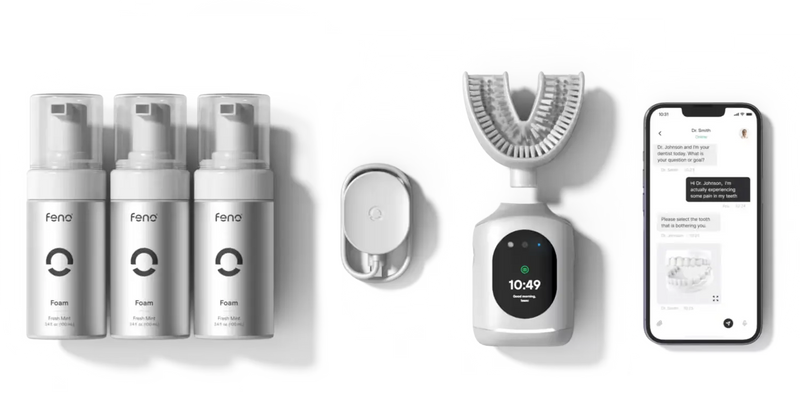
Nasal Bad Breath: Causes, Diagnosis, and How to Fix It
Essential Takeaways
- If you've ruled out poor dental hygiene, cavities, or dry mouth but still struggle with persistent odor, your sinuses deserve investigation. Simple interventions like saline irrigation and staying hydrated often resolve the issue, and comprehensive oral care including the Feno Smartbrush's 20-second cleaning and 18,000 bristles for thorough coverage keeps your mouth healthy while you address nasal sources.
That persistent bad breath that won't go away despite diligent brushing and flossing? The culprit might not be your mouth at all. Sinus infections, chronic sinusitis, and postnasal drip are surprisingly common sources of halitosis, accounting for a significant portion of extraoral bad breath cases that people struggle with for years.
(International Journal of Dental Hygiene, 2022)
What Research Shows
Sinusitis and postnasal drip create ideal conditions for odor-producing bacteria. When mucus stagnates in your nasal passages and sinuses, it traps bacteria and creates anaerobic environments, low-oxygen spaces where harmful microorganisms thrive. These bacteria produce volatile sulfur compounds (VSCs), the same smelly molecules responsible for oral bad breath. The difference? No amount of mouthwash will fix it if the source is above your mouth.
(International Journal of Dental Hygiene, 2022)
Research confirms that people with chronic sinusitis experience significantly higher rates of halitosis due to bacterial colonization and mucus accumulation. Postnasal drip delivers this bacterial-laden mucus directly into your throat, where it continues releasing odor compounds.
The good news: nasal-source bad breath is treatable. Clinical studies show that addressing the underlying sinus or nasal issue whether bacterial overgrowth, inflammation, or allergic rhinitis effectively resolves the odor.
(International Journal of Dental Hygiene, 2022)
Protective Steps
Use saline nasal sprays or neti pots regularly. Saline irrigation clears stagnant mucus, reduces bacterial load, and maintains healthy sinus drainage. Clinical research supports routine nasal irrigation as a safe, non-pharmaceutical way to prevent bacterial overgrowth and postnasal drip.
Stay hydrated to thin mucus. Thick mucus is harder to drain and creates more anaerobic pockets for bacteria. Drinking adequate water helps your body produce thinner, more mobile mucus that drains naturally.
Address allergies and infections early. Allergic rhinitis and untreated infections are the root causes of chronic sinusitis. Managing these early before they become chronic, prevents the bacterial overgrowth and mucus buildup that leads to bad breath.
When needed, work with your doctor. If saline irrigation and lifestyle changes don't resolve the issue, bacterial sinusitis may require antibiotics or other professional treatment. Your doctor can determine the underlying cause and recommend the right approach.
The Feno Smartbrush’s 20-second full-mouth clean and 18,000 bristles help maintain a healthy oral environment, reducing the chance that bacteria from postnasal drip worsen the odor.
Bad breath isn't always a mouth problem. Sometimes, the problem starts in your sinuses.

Feno Founders Edition Bundle
Advanced Oral Health in 20 Seconds with the Feno Smartbrush™
Get Yours Now!





